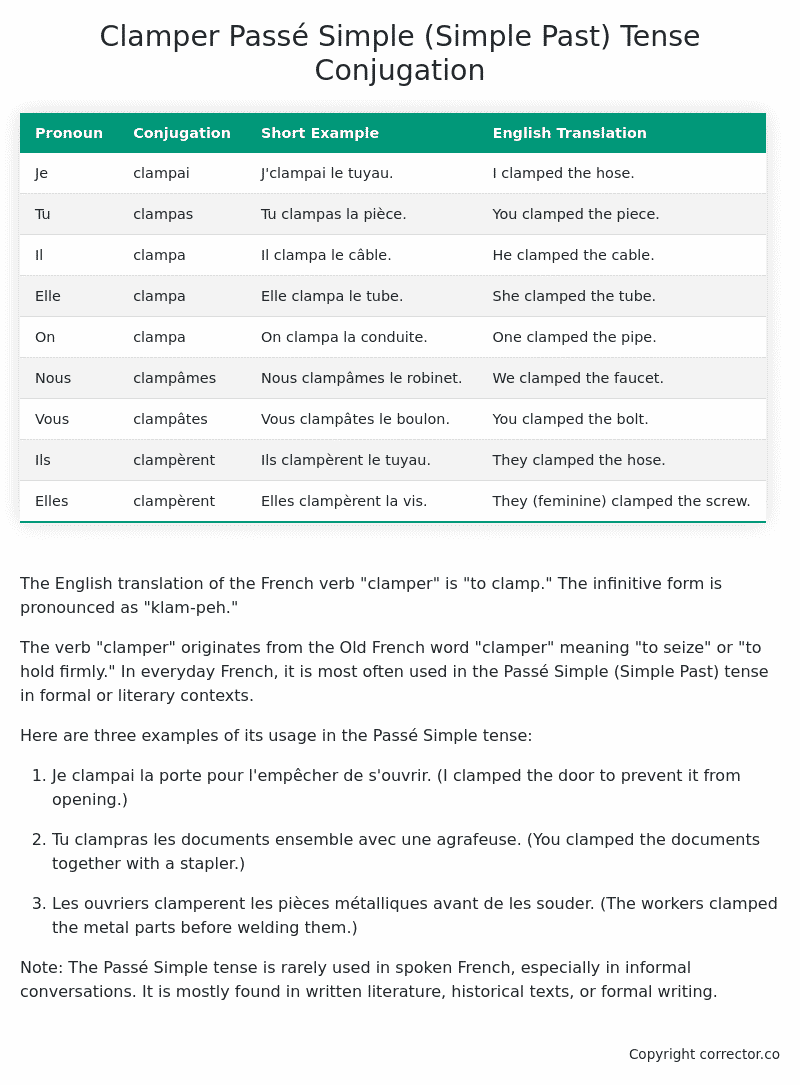Passé Simple (Simple Past) Tense Conjugation of the French Verb clamper
Introduction to the verb clamper
The English translation of the French verb “clamper” is “to clamp.” The infinitive form is pronounced as “klam-peh.”
The verb “clamper” originates from the Old French word “clamper” meaning “to seize” or “to hold firmly.” In everyday French, it is most often used in the Passé Simple (Simple Past) tense in formal or literary contexts.
Here are three examples of its usage in the Passé Simple tense:
-
Je clampai la porte pour l’empêcher de s’ouvrir.
(I clamped the door to prevent it from opening.) -
Tu clampras les documents ensemble avec une agrafeuse.
(You clamped the documents together with a stapler.) -
Les ouvriers clamperent les pièces métalliques avant de les souder.
(The workers clamped the metal parts before welding them.)
Note: The Passé Simple tense is rarely used in spoken French, especially in informal conversations. It is mostly found in written literature, historical texts, or formal writing.
Table of the Passé Simple (Simple Past) Tense Conjugation of clamper
| Pronoun | Conjugation | Short Example | English Translation |
|---|---|---|---|
| Je | clampai | J’clampai le tuyau. | I clamped the hose. |
| Tu | clampas | Tu clampas la pièce. | You clamped the piece. |
| Il | clampa | Il clampa le câble. | He clamped the cable. |
| Elle | clampa | Elle clampa le tube. | She clamped the tube. |
| On | clampa | On clampa la conduite. | One clamped the pipe. |
| Nous | clampâmes | Nous clampâmes le robinet. | We clamped the faucet. |
| Vous | clampâtes | Vous clampâtes le boulon. | You clamped the bolt. |
| Ils | clampèrent | Ils clampèrent le tuyau. | They clamped the hose. |
| Elles | clampèrent | Elles clampèrent la vis. | They (feminine) clamped the screw. |
Other Conjugations for Clamper.
Le Present (Present Tense) Conjugation of the French Verb clamper
Imparfait (Imperfect) Tense Conjugation of the French Verb clamper
Passé Simple (Simple Past) Tense Conjugation of the French Verb clamper (You’re reading it right now!)
Passé Composé (Present Perfect) Tense Conjugation of the French Verb clamper
Futur Simple (Simple Future) Tense Conjugation of the French Verb clamper
Futur Proche (Near Future) Tense Conjugation of the French Verb clamper
Plus-que-parfait (Pluperfect) Tense Conjugation of the French Verb clamper
Passé Antérieur (Past Anterior) Tense Conjugation of the French Verb clamper
Futur Antérieur (Future Anterior) Tense Conjugation of the French Verb clamper
Subjonctif Présent (Subjunctive Present) Tense Conjugation of the French Verb clamper
Subjonctif Passé (Subjunctive Past) Tense Conjugation of the French Verb clamper
Subjonctif Imparfait (Subjunctive Imperfect) Tense Conjugation of the French Verb clamper
Subjonctif Plus-que-parfait (Subjunctive Pluperfect) Tense Conjugation of the French Verb clamper
Conditionnel Présent (Conditional Present) Tense Conjugation of the French Verb clamper
Conditionnel Passé (Conditional Past) Tense Conjugation of the French Verb clamper
Conditionnel Passé II (Conditional Past II) Tense Conjugation of the French Verb clamper
L’impératif Présent (Imperative Present) Tense Conjugation of the French Verb clamper
L’impératif Passé (Imperative Past) Tense Conjugation of the French Verb clamper
L’infinitif Présent (Infinitive Present) Tense Conjugation of the French Verb clamper
L’infinitif Passé (Infinitive Past) Tense Conjugation of the French Verb clamper
Le Participe Présent (Present Participle) Tense Conjugation of the French Verb clamper
Le Participe Passé (Past Participle) Tense Conjugation of the French Verb clamper
Struggling with French verbs or the language in general? Why not use our free French Grammar Checker – no registration required!
Get a FREE Download Study Sheet of this Conjugation 🔥
Simply right click the image below, click “save image” and get your free reference for the clamper Passé Simple tense conjugation!

Clamper – About the French Passé Simple (Simple Past) Tense
Formation
Usage
Narration
Historical Context
Interactions with other tenses
Passé Composé
Imparfait
Conditional and Subjunctive
Summary
I hope you enjoyed this article on the verb clamper. Still in a learning mood? Check out another TOTALLY random French verb conjugation!


